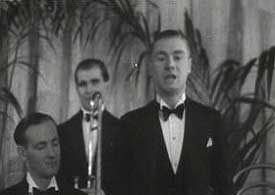 The full title card reads: "Millions have heard him on the Radio -- or Record -- He he is on the Screen -- Roy Fox & His Band (from the Monseigneur, London)" (1932).
The full title card reads: "Millions have heard him on the Radio -- or Record -- He he is on the Screen -- Roy Fox & His Band (from the Monseigneur, London)" (1932).
Roy personally narrates over the title card: "This is Roy Fox speaking. The boys & I have the pleasure of playing a new comedy foxtrot called 'It Ain't No Fault of Mine.'"
It definitely plays out as a comedy number, starting with an Ocarina, then the ten-man band picks up the tune which resembles a lot of folky sorts of children's songs (you could sing to it either "I went down to grampa's farm billy goat chased me round the barn" or "I come from alibammy with a banjo on my knee" or "There Ain't No Bugs on Me").
Though Al Bowlly isn't the main singer on this one, he's seen in the band playing guitar. Lew Stone is at the piano.
Trumpeter Nat Gonella stands from the bandstand & strides center front to sing with a working-class accent so thick I can only guess at some of the words:
"They said that Mary had a lamb/ It's fleece was oh so white/ And everywhere that Mary went/ The geese would always bite."
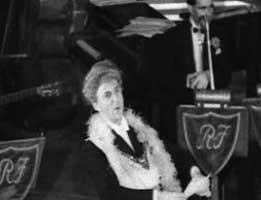 Then the whole band choruses: "Oh, it ain't no fault of mine/ No it ain't no fault of mine/ If the garlic makes the baby strong/ It ain't no fault of mine." Then the whole band choruses: "Oh, it ain't no fault of mine/ No it ain't no fault of mine/ If the garlic makes the baby strong/ It ain't no fault of mine."
Several more silly verses follow in the same pattern & a "big" close of three ocarinas. It's cute & represents an older style of music hall foolery which no one would mistake for good music.
This was filmed live at the west-end cabaret around the same time as Douglas Bynge & Roy Fox (1932). This one starts with Roy Fox's orchestra doing a serious instrumental, with clientelle of the Monsigneur seen dancing.
Bynge, "the celebrated west-end comedian," was, along with Fox's orchestra part of "The New Empire Review." He dominates the last half of this blessedly short-short film, doing an intentionally awful rendition of "Spring is in the Air" in dowager drag.
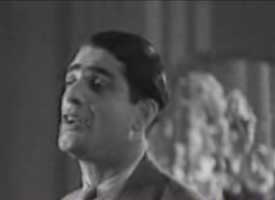 "A singer known to millions of Radio listeners," we are told, is Al Bowlly from Lew Stone's Monseignor Band (1934), alluding to the house band of a cabaret called Monseignor in London. The band isn't part of this tiny film, but it does feature Monie Liter at the piano.
"A singer known to millions of Radio listeners," we are told, is Al Bowlly from Lew Stone's Monseignor Band (1934), alluding to the house band of a cabaret called Monseignor in London. The band isn't part of this tiny film, but it does feature Monie Liter at the piano.
Al is brought out by a couple chums, & he's grumbling & complaining about who knows what, climbs up on the piano to sit, & asks where his piano player's at. Monie rushes out & takes his seat on the piano bench. Al takes Monie's hat off him & tosses it at the camera.
The mood is whimsical enough one expects a comedy number. But Al sings "The Very Thought of You" in a Roaring 'Twenties style better than Rudy Vallee, very sweet:
"I don't need your photograph to keep by my bed/ Your picture is always in my head/ I don't need your portrait dear to bring you to mind/ For sleeping or waking dear, I find/
"The very thought of you/ And I forget to do/ The little ordinary things that everyone ought to do/ I'm living in a kind of daydream/ And I'm happy as a king/ And foolish though it may seem/ Why to me that's everything..." It's truly lovely.
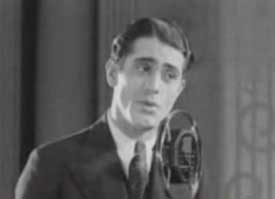 Albert Allick "Al" Bowlly was a top radio singer in England in the 1930s. Although he's been described as the British Bing Crosby, he developed his singing style in the 1920s touring from the Far East to Europe. The older singing style was kept current longer in England than in America thanks to the London Music Halls.
Albert Allick "Al" Bowlly was a top radio singer in England in the 1930s. Although he's been described as the British Bing Crosby, he developed his singing style in the 1920s touring from the Far East to Europe. The older singing style was kept current longer in England than in America thanks to the London Music Halls.
So Al sounds very much like a romantic singer of the Roaring Twenties, of the Rudy Vallee school, with an ounce of Jolsen thrown in. In this vocal arena he was first-rate, & has aged well.
He lived a couple of years in America in the mid-30s but never achieved great fame here, & returned to England when he found he needed throat surgery. Upon healing he regained some career momentum, but wasn't the equal of his former self.
He died too soon, in 1941, in his flat near Piccadilly, when a German parachute-mine exploded nearby, blew the door form its hinges & across the room, striking him a fatal blow.
In the short-short Al Bowlly: Melancholy Baby (1936), Al with just the piano accompaniment stands before a microphone, introduces himself, then sings "Melancholy Baby" only slightly less charmingly than Jolsen would've done it.
This is a very simple unadorned vocal performance entirely loveable. Al Bowlly is oddly handsome & has a great voice for the romantic-twenties style.
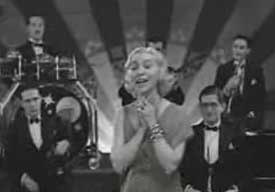 The full text of the title card on this 1931 short-short reads: "Millions of listeners have heard the next folk, Howard Jacobs & the Savoy Hotel Orpheans with Carrol Gibbons in I'm For You One Hundred Percent Introducing Frances Day of West End Cabaret Fame."
The full text of the title card on this 1931 short-short reads: "Millions of listeners have heard the next folk, Howard Jacobs & the Savoy Hotel Orpheans with Carrol Gibbons in I'm For You One Hundred Percent Introducing Frances Day of West End Cabaret Fame."
The band has a delightful mellow swing sound & an easy reed-dominant slow beat maintained by the rhythm guitar in back. Looks like twelve musicians including conductor Howard Jacobs on clarinet. Very, very sweet instrumental.
Then out strolls Carol Gibbons, a very pretty flapperish blonde, who sings: "To say I love him badly/ Would be expressing it badly/ Delicious one/ What have you done to me/
"To say I love him mildlly/ Would be expressing it wildly/ And so to sing his praises/ I keep digging up new phrases."
After the great instrumental lead in, this opening to the lyrics is pretty awful, but it's only the introductory lyric for a song that sounds much better when the main body of the tune is sung:
"I would give a hundred percent/ In a million ways/ He's for me a hundred percent/ And that's a lot these days..."
It's more cute than actually good, & it does capture a bit of the flapper tone & attitude today associated with Betty Boop, & I do love that.
Continue to:
Vitaphone Varieties Musical Shorts among the extras
copyright © by Paghat the Ratgirl
|
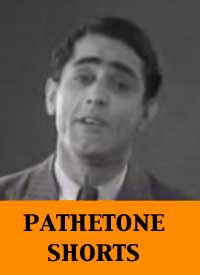

 Then the whole band choruses: "Oh, it ain't no fault of mine/ No it ain't no fault of mine/ If the garlic makes the baby strong/ It ain't no fault of mine."
Then the whole band choruses: "Oh, it ain't no fault of mine/ No it ain't no fault of mine/ If the garlic makes the baby strong/ It ain't no fault of mine."

